nemes krupieci Bauer Gyula
tábornok
(1862. augusztus 25., Tata - 1942 Budapest)
Bauer tábornok vallásos zsidó családban született Komárom vármegyében. Rövid, ám heves udvarlást követően, 1911. szeptember 14.-én házasságot kötött a kiváló költő, Kiss József leányával, Kiss Erzsébettel. Leveleiből kitűnik, hogy az akkor már viszonylag idős, majdnem 50 éves Bauer korábban is ismerte Kiss Józsefet, lányaival azonban csak 1911 januárjában találkozott; Erzsébetet hamar meghódította a fess katona, és már májusban eljegyezték egymást.
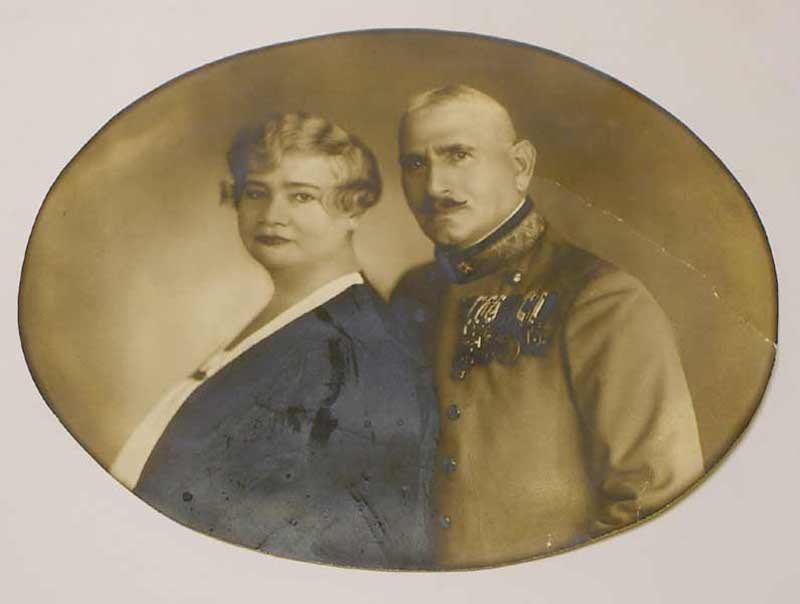
Bauer Gyula és Bauer Gyuláné Kiss Erzsébet / Mr. and Mrs. Gyula Bauer
(Forrás: www.judaica.hu)
Házasságukból egy gyönyörű kislány, krupieci Bauer Sára (1937-től Halmágyi Zoltánné) született, 1917-ben.
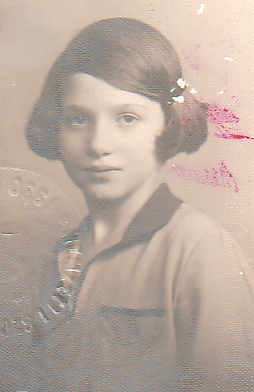
Bauer Sára 1932-ben / Sarah Bauer in 1932
(Magángyűjtemény - Private Collection)
Levelésük alapján kijelenthető, hogy Bauer Gyula mindvégig gondoskodó, szerető apának bizonyult, sajnos azonban feleségével viszonya megromlott, és 1919 december 5.-én, egy meglehetősen csúnya vagyonmegosztási vitát követően el is váltak. A rendelkezésre álló családi levelezés alapján úgy tűnik, hogy Bauer szolgálati kötelmei már a kezdetek kezdetén zavarták Kiss Erzsébetet, a háború okozta hosszú távollét pedig véglegesen megmérgezte kapcsolatukat.
Katonai pályafutása 1882-ben indul meg, ekkor kerül hadapródként a cs. és. kir. 12. Gyalogezredhez, ahol 25 esztendőn keresztül teljesített alantas tiszti beosztásokban szolgálatot; ezen idő alatt a vegyes nemzetiségű tisztikar magyar nyelvtanára is volt. Kiváló céllövő és lovas volt, számos díjat elnyert a különféle alakulatok közötti versenyeken.

Bauer Gyula cs. és kir. őrnagy 1910-ben / Major Gyula Bauer in 1910
(Magángyűjtemény)
1910-ben lépett elő őrnaggyá, egyidejűleg áthelyezték a cs. és kir. 68. Gyalogezredhez. A békeidőben Bécsben állomásozó, de eredetileg somogyi 44. Gyalogezredhez 1914. augusztusában, a háború kitörésekor osztották be, szolgálata kezdetekor már alezredesi rendfokozatot viselt.
A háború kezdetéig az alábbi kitüntetéseket és elismeréseket adományozták részére:
III. osztályú tiszti szolgálati jel (1907)
Jubileumi Emlékérem a Fegyveres Erők tagjai számára (1998)
Jubileumi Emlékkereszt a Fegyveres Erők tagjai számára (1908)
1912-1913 évi Mozgósítási Kereszt (1913)
Négy alkalommal kapott írásbeli hadtest- illetve hadosztályparancsnoki dicséretet, és számos katonai sportverseny díját nyerte el.
Ezredesi kinevezést 1915-ben kapott, egyidejűleg kinevezték a cs. és kir. 44. "Erherzog Albrecht" Gyalogezred parancsnokává; e beosztásában nemes frankenhardti Mihanovics Károly ezredes előzte meg.
A 44. Gyalogezred tagjai teljes mértékben összeforrtak kiváló parancsnokukkal; büszkék voltak rá, elterjedt becenevüket, a "rosseb ezred" elnevezést is állítólag Bauertől kapták, a somogyi bakák által sűrűn használt káromkodás után; Bauer a háború borzalmai között, és azt követően is vallásos zsidó ember maradt, katonáit azonban minden nemzetiségi, vagy felekezeti különbségtétel nélkül vezette.
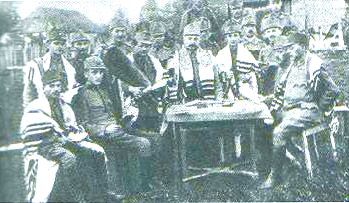
Bauer ezredes zsidó katonái körében a fronton / Colonel Bauer with some of his jewish soldiers in the frontline
(Aranyalbum)
Nem a front mögül irányította a harcokat, hanem a veszélyek közepette is együtt volt katonáival; megkapta a Károly Csapatkeresztet, és a Sebesültek Érmét is, két középsávval, két sebesülésért. Kiváló ezredparancsnoki ténykedéséért Ő Felsége IV. Károly király Bauer Gyula ezredest "krupieci" praedicatummal a Magyar Királyság nemesei közé és sorába emelte.
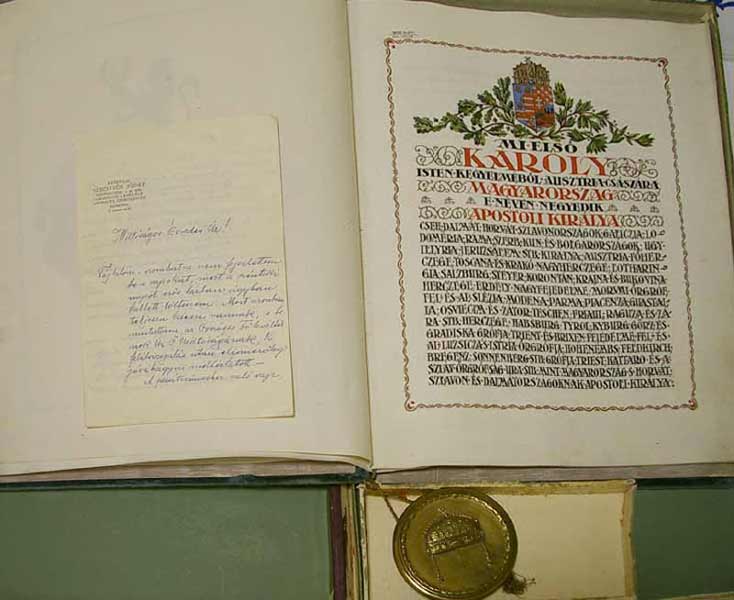
Bauer ezredes 1917-es nemeslevele / Diplom of Nobility by H. M. Charles the Fourth
(Forrás: www.judaica.hu)
Múlhatatlan érdeme, hogy azon parancsnokok közé tartozott, akik a rájuk bízott alakulatot (ekkor már nemcsak a 44. Gyalogezred, hanem a 62. Gyalogdandár parancsnoka is volt) hazavezették; Bauerék a piavei harctérről teljes rendben és a rájuk bízott harci eszközök birtokában tértek haza Kaposvárra. A forradalmak után Bauer ezredes nyugállományba vonult, azonban 1921-ben még abban a tisztességben részesült, hogy nemes sióagárdi Zöld Márton ezredessel együtt, Horthy Miklós kormányzó tábornoki címmel és jelleggel tüntette ki. Ők ketten voltak a M. Kir. Honvédség egyedüli zsidó vallású tábornokai, akik a tábornoki címet nagybányai Horthy Miklós kezéből nyerték el.
A világháború során Bauer ezredes az alábbi érdemrendeket és kitüntetéseket nyerte el:
Osztrák Császári Vaskorona Rend hadiékítményes III. osztálya a kardokkal (1915)
Katonai Érdemkereszt hadiékítményes III. osztálya a kardokkal (1916)
Bronz Katonai Érdemérem a hadiszalagon a kardokkal (1914)
Károly Csapatkereszt (1917)
Sebesülési Érem két középsávval (1918)
Birtokosa volt még az Osztrák és a Bolgár Háborús Emlékérmeknek.
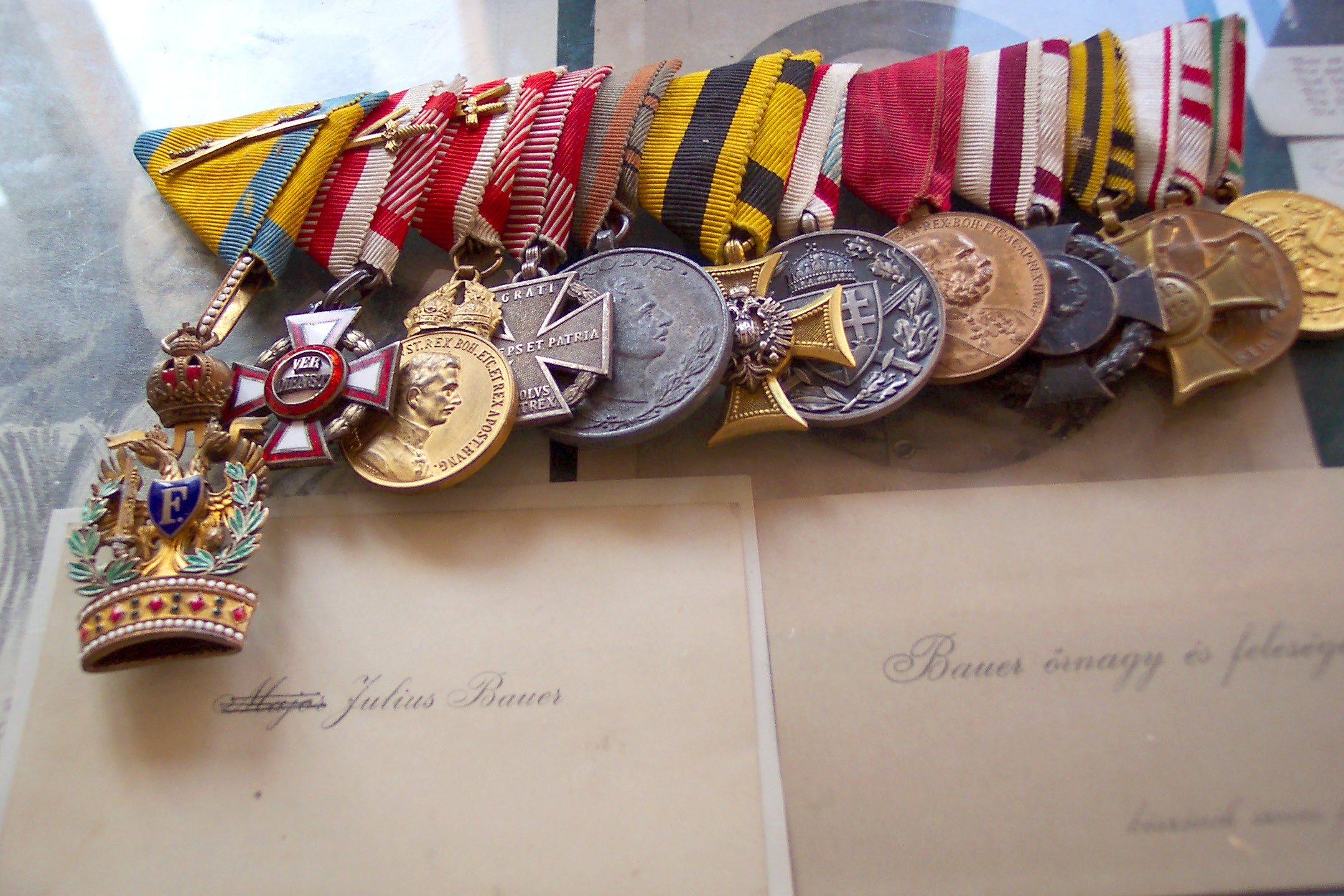
Bauer tábornok teljes kitüntetéssora / All the Medals and Orders of General Bauer
(Magángyűjtemény, nem az eredeti kitüntetésekből összeállítva - Private collection, not the original medals received by Bauer)
1920 után a volt cs. és kir. 44. "ALBRECHT FŐHERCEG" Gyalogezred Bajtársi Szövetsége elnöke volt; katonái iránt érzett szeretete, kitartása tette lehetővé, hogy a Rosseb Ezred történetét bemutató kiváló, részletes munka (Kurtz Géza és vitéz Kristófy Géza nyá. ezredesek tollából) 1937-ben kiadásra kerülhetett. Válása után magánélete sosem rendeződött, megtört emberként hunyt el. Sírja a Farkasréti temető izraelita parcellájában található, sírkövét a 44-esek jelmondata, az "Előre, rosebb!" díszíti.
(1862. augusztus 25., Tata - 1942 Budapest)
Bauer tábornok vallásos zsidó családban született Komárom vármegyében. Rövid, ám heves udvarlást követően, 1911. szeptember 14.-én házasságot kötött a kiváló költő, Kiss József leányával, Kiss Erzsébettel. Leveleiből kitűnik, hogy az akkor már viszonylag idős, majdnem 50 éves Bauer korábban is ismerte Kiss Józsefet, lányaival azonban csak 1911 januárjában találkozott; Erzsébetet hamar meghódította a fess katona, és már májusban eljegyezték egymást.

Bauer Gyula és Bauer Gyuláné Kiss Erzsébet / Mr. and Mrs. Gyula Bauer
(Forrás: www.judaica.hu)
Házasságukból egy gyönyörű kislány, krupieci Bauer Sára (1937-től Halmágyi Zoltánné) született, 1917-ben.

Bauer Sára 1932-ben / Sarah Bauer in 1932
(Magángyűjtemény - Private Collection)
Levelésük alapján kijelenthető, hogy Bauer Gyula mindvégig gondoskodó, szerető apának bizonyult, sajnos azonban feleségével viszonya megromlott, és 1919 december 5.-én, egy meglehetősen csúnya vagyonmegosztási vitát követően el is váltak. A rendelkezésre álló családi levelezés alapján úgy tűnik, hogy Bauer szolgálati kötelmei már a kezdetek kezdetén zavarták Kiss Erzsébetet, a háború okozta hosszú távollét pedig véglegesen megmérgezte kapcsolatukat.
Katonai pályafutása 1882-ben indul meg, ekkor kerül hadapródként a cs. és. kir. 12. Gyalogezredhez, ahol 25 esztendőn keresztül teljesített alantas tiszti beosztásokban szolgálatot; ezen idő alatt a vegyes nemzetiségű tisztikar magyar nyelvtanára is volt. Kiváló céllövő és lovas volt, számos díjat elnyert a különféle alakulatok közötti versenyeken.

Bauer Gyula cs. és kir. őrnagy 1910-ben / Major Gyula Bauer in 1910
(Magángyűjtemény)
1910-ben lépett elő őrnaggyá, egyidejűleg áthelyezték a cs. és kir. 68. Gyalogezredhez. A békeidőben Bécsben állomásozó, de eredetileg somogyi 44. Gyalogezredhez 1914. augusztusában, a háború kitörésekor osztották be, szolgálata kezdetekor már alezredesi rendfokozatot viselt.
A háború kezdetéig az alábbi kitüntetéseket és elismeréseket adományozták részére:
III. osztályú tiszti szolgálati jel (1907)
Jubileumi Emlékérem a Fegyveres Erők tagjai számára (1998)
Jubileumi Emlékkereszt a Fegyveres Erők tagjai számára (1908)
1912-1913 évi Mozgósítási Kereszt (1913)
Négy alkalommal kapott írásbeli hadtest- illetve hadosztályparancsnoki dicséretet, és számos katonai sportverseny díját nyerte el.
Ezredesi kinevezést 1915-ben kapott, egyidejűleg kinevezték a cs. és kir. 44. "Erherzog Albrecht" Gyalogezred parancsnokává; e beosztásában nemes frankenhardti Mihanovics Károly ezredes előzte meg.
A 44. Gyalogezred tagjai teljes mértékben összeforrtak kiváló parancsnokukkal; büszkék voltak rá, elterjedt becenevüket, a "rosseb ezred" elnevezést is állítólag Bauertől kapták, a somogyi bakák által sűrűn használt káromkodás után; Bauer a háború borzalmai között, és azt követően is vallásos zsidó ember maradt, katonáit azonban minden nemzetiségi, vagy felekezeti különbségtétel nélkül vezette.

Bauer ezredes zsidó katonái körében a fronton / Colonel Bauer with some of his jewish soldiers in the frontline
(Aranyalbum)
Nem a front mögül irányította a harcokat, hanem a veszélyek közepette is együtt volt katonáival; megkapta a Károly Csapatkeresztet, és a Sebesültek Érmét is, két középsávval, két sebesülésért. Kiváló ezredparancsnoki ténykedéséért Ő Felsége IV. Károly király Bauer Gyula ezredest "krupieci" praedicatummal a Magyar Királyság nemesei közé és sorába emelte.

Bauer ezredes 1917-es nemeslevele / Diplom of Nobility by H. M. Charles the Fourth
(Forrás: www.judaica.hu)
Múlhatatlan érdeme, hogy azon parancsnokok közé tartozott, akik a rájuk bízott alakulatot (ekkor már nemcsak a 44. Gyalogezred, hanem a 62. Gyalogdandár parancsnoka is volt) hazavezették; Bauerék a piavei harctérről teljes rendben és a rájuk bízott harci eszközök birtokában tértek haza Kaposvárra. A forradalmak után Bauer ezredes nyugállományba vonult, azonban 1921-ben még abban a tisztességben részesült, hogy nemes sióagárdi Zöld Márton ezredessel együtt, Horthy Miklós kormányzó tábornoki címmel és jelleggel tüntette ki. Ők ketten voltak a M. Kir. Honvédség egyedüli zsidó vallású tábornokai, akik a tábornoki címet nagybányai Horthy Miklós kezéből nyerték el.
A világháború során Bauer ezredes az alábbi érdemrendeket és kitüntetéseket nyerte el:
Osztrák Császári Vaskorona Rend hadiékítményes III. osztálya a kardokkal (1915)
Katonai Érdemkereszt hadiékítményes III. osztálya a kardokkal (1916)
Bronz Katonai Érdemérem a hadiszalagon a kardokkal (1914)
Károly Csapatkereszt (1917)
Sebesülési Érem két középsávval (1918)
Birtokosa volt még az Osztrák és a Bolgár Háborús Emlékérmeknek.

Bauer tábornok teljes kitüntetéssora / All the Medals and Orders of General Bauer
(Magángyűjtemény, nem az eredeti kitüntetésekből összeállítva - Private collection, not the original medals received by Bauer)
1920 után a volt cs. és kir. 44. "ALBRECHT FŐHERCEG" Gyalogezred Bajtársi Szövetsége elnöke volt; katonái iránt érzett szeretete, kitartása tette lehetővé, hogy a Rosseb Ezred történetét bemutató kiváló, részletes munka (Kurtz Géza és vitéz Kristófy Géza nyá. ezredesek tollából) 1937-ben kiadásra kerülhetett. Válása után magánélete sosem rendeződött, megtört emberként hunyt el. Sírja a Farkasréti temető izraelita parcellájában található, sírkövét a 44-esek jelmondata, az "Előre, rosebb!" díszíti.
(Tata, 1862.08.25. - Budapest, 1942)
General Bauer was born in a religious hungarian-jewish family in Komarom County. He was married to Erzsebet Kiss, (daughter of the famous hungarian jewish poet, Jozsef Kiss) in 1911. Bauer knew the great poet earlier, but met his daughters first in January, 1911. Erzsebet has fallen in love with the charming officer, and despite Bauer was far older, they were already engaged in May.
The couple's only daughter, the wonderful Sarah Bauer of Krupiec was born in 1917. According to their personal correspondance, Bauer seems to be a good and solicitous father, but unfortunately the marriage went bad due to the long time they've spent separated during the war and they divorced in 1919.
Bauer's military carrier started in 1882, when he joined the K. u. K. 12th Infantry Regiment as a cadet. He spent 25 years with this unit, serving in different positions of a low-rank officer; he was also the hungarian language teacher of the multi-national officer corps of the regiment. Bauer was a very talented shooter and horse-rider, won multiple awards during different military sport contests. Captain Bauer was promoted to Major in 1910, and has been attached to the K. u. K. 68th Infantry Regiment. He joined the K. u. K. 44th "Erzherzog Albrecht" Infantry Regiment in 1914, at the beginning of the war, bearing the rank of a lieutenant-colonel.
Until the beginning of the Great War, Bauer was awarded with the following medals:
Officer's Service Cross, III. Class (1907)
Jubilee Medal for the members of the Armed Forces (1898)
Jubilee Cross for the members of the Armed Forces (1908)
Mobilisation Cross (1913)
He was promoted to full colonel in 1915, at the same time he became the colonel-in-chief of the Regiment. His soldiers adored Bauer, they were proud to serve under his command; Bauer was also very much proud of his "villains" from Somogy county, even the best known nickname of the Regiment originates from Bauer, based on the infamously unpolite way of speaking of the soldiers; they were widely called the "Rosseb Regiment"; "Rosseb" is a hungarian word, meaning literally "Damned" in english. Bauer remained a religious, devoted jew during his whole life, including the days he spent in the frontline with his soldiers; still, he led all of the soldiers with the same enthusiasm and devotion. He fought along with his soldiers in the trenches, in the and received the Charles Troop Cross, plus the Wound Medal for his two wounds.
Bauer's professinalism as a commander was often acknowledged by his supreme commanders, even by His Majesty the King; Colonel Bauer was nominated among the nobles of the Kingdom of Hungary in 1917, and authorised to use the title "Noble of Krupiec" in his name. It is the finest example of the smooth cooperation between the commander and his soldiers, that Bauer belonged to those few commanders, who led their troops back to the home garrisons in order with all the military equipment. As the commander of the 44. Regiment and the 62. Infantry Dandar, they returned to Kaposvar (Somogy County) in Hungary in full order. After the revolutions of 1919 Colonel Bauer retired from the active service, but in 1921 he was promoted to General by Admiral Miklos Horthy, Regent of the Kingdom of Hungary. Along with Gen. Marton Zöld Noble of Sioagard, he was the only jewish officer who's been promoted to General by Miklos Horthy.
During the war Colonel Bauer received the following Orders and Medals:
Imperial Austrian Order of the Iron Crown with the war decoration and swords, III. Class (1915)
Military Merit Cross with war decoration and swords, III. Class (1916)
Bronze Military Merit Medal on the war ribbon with swords (1917)
Charles Troop Cross (1917)
Wound Medal for two wounds (1918)
After the war Bauer also received the Hungarian, the Austrian, and the Bulgarian War Medals for combattants.
After 1920 he became the president of the Comrade's Society of the 44th Infantry Regiment. His total devotion and love to the soldiers made possible, that a very well written regiment history was published in 1937, authored by Colonels Geza Kurtz and Geza Kristofy.